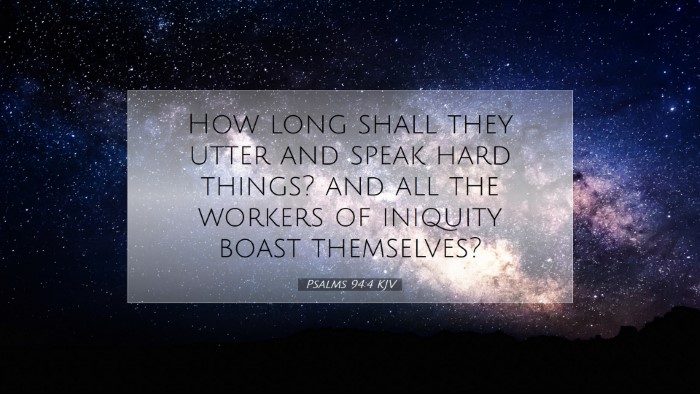Psalms 94:4 - Commentary Summary
Verse Context: Psalms 94:4 reads: "How long shall they utter and speak hard things? and all the workers of iniquity boast themselves?" This verse is situated within a psalm that expresses deep concern and lament regarding the prosperity of the wicked and the suffering of the righteous. This commentary will derive insights from public domain sources to explore the implications of this text.
Exegesis of Psalms 94:4
The psalmist grapples with a tension often observed in biblical literature—the apparent triumph of wrongdoers amidst the struggles of the faithful. His rhetorical questions underscore an urgent plea for divine intervention against injustice. The phrase “How long” conveys a sense of impatience and yearning for God’s justice.
Insights from Matthew Henry
Henry observes that the psalmist is troubled by the blasphemous words spoken by the wicked. Their arrogance is palpable as they speak "hard things" against God’s people. Henry emphasizes the importance of the psalms as a means of expressing human emotions—fear, anger, and despair—especially in relation to suffering.
He highlights that the "workers of iniquity" boast in their unchecked deeds, which serves to taunt the faithful. This commentary suggests that such pompousness not only reveals their character but also the desperate need for God’s justice to be manifest. In the broader sense, Henry invites readers to recognize that their troubles are not hidden from God, who is aware of the wickedness surrounding them.
Insights from Albert Barnes
Barnes approaches the verse with a focus on the problem of theodicy—the question of divine justice in light of earthly injustice. He interprets the "hard things" as both blasphemous statements and oppressive actions against God’s people. Barnes notes that the prosperity of the wicked creates doubt in the minds of the faithful regarding God’s sovereignty.
He elaborates that the boastfulness of the "workers of iniquity" points to a discrepancy between God’s holiness and the behavior of those who seem to escape judgment. The exhortation to God posed by the psalmist reveals a longing for relief and assurance that God sees the context of each situation—a reminder that true justice is ultimately in God’s hands.
Insights from Adam Clarke
Clarke's commentary emphasizes the rhetorical question posed by the psalmist, illustrating a sense of urgency mixed with despair. His methodical analysis digs into the larger narrative of the psalm, suggesting that it resonates with the readers' struggles in the face of adversity. Clarke highlights the psychological aspect of witnessing injustice, acknowledging that the faithful may experience feelings of helplessness.
Building off this emotional framework, Clarke points to the inherent power of prayer and lament within the psalm. He argues that expressing these grievances is not only therapeutic but also a call to action, encouraging believers to approach God with their doubts and concerns for vindication.
Theological Implications
This verse has significant implications for understanding human suffering and divine justice. The interplay between lamentation and hope serves as a theological reflection that can resonate deeply with pastors, students, and theologians.The earnestness of the psalmist's plea captures the heart of the biblical narrative—a God who listens, cares, and ultimately upholds justice.
Pastoral Applications
- Lament as Worship: The psalmist’s approach demonstrates that lament can be an essential aspect of worship. Pastors should encourage congregants to articulate their struggles and doubts, recognizing that God invites such expressions.
- Encouragement in Injustice: As clergy address issues of social justice, they can use this psalm to affirm that God is aware of the struggles faced by the marginalized and oppressed. This awareness can instill hope in those who suffer.
- Rethinking Divine Timing: Believers are reminded that God operates outside of human timelines. This understanding can help foster patience and trust in God’s ultimate plan.
Conclusion
Psalms 94:4 encapsulates the anguish many feel in the presence of rampant injustice. Drawing insights from Matthew Henry, Albert Barnes, and Adam Clarke, we see a multifaceted approach to understanding the divine character in the face of human complexity. The verse not only serves as an expression of lament but also as a beacon of hope for those seeking justice.


